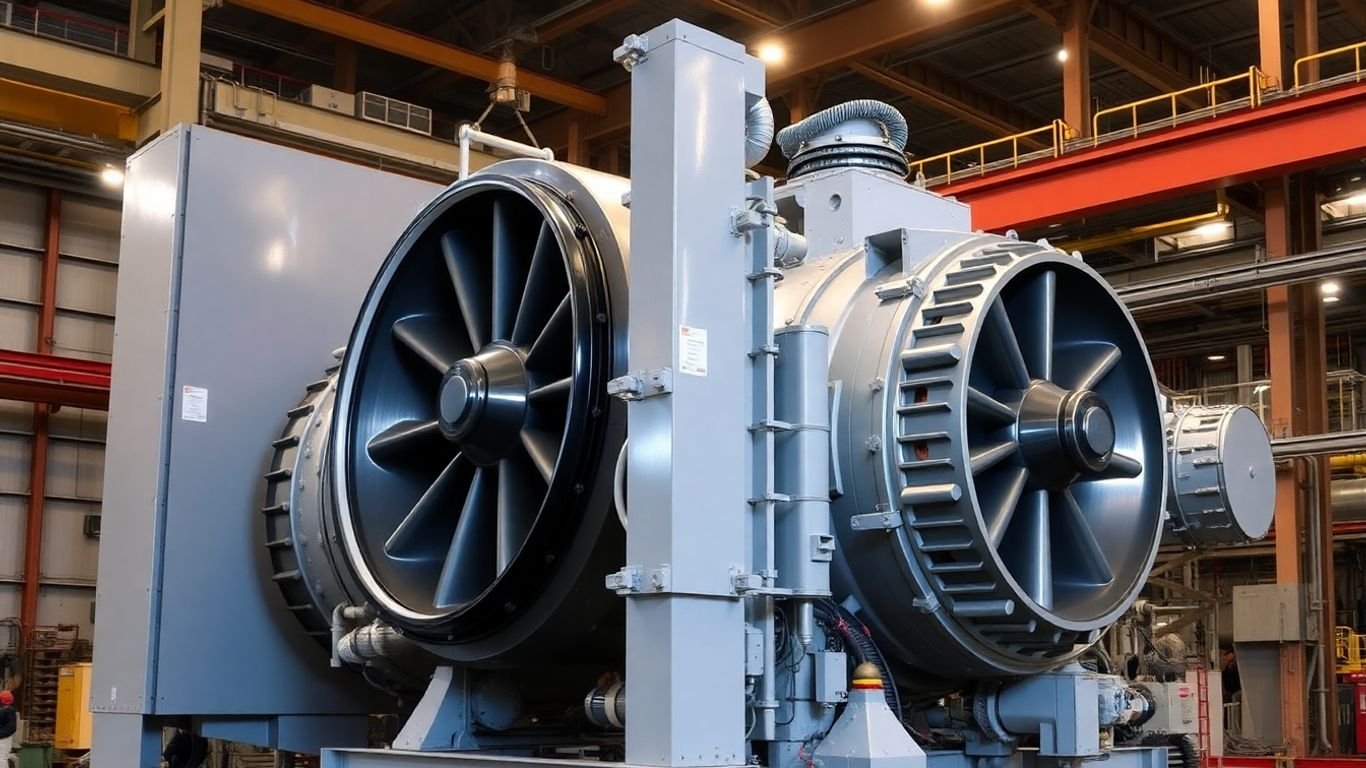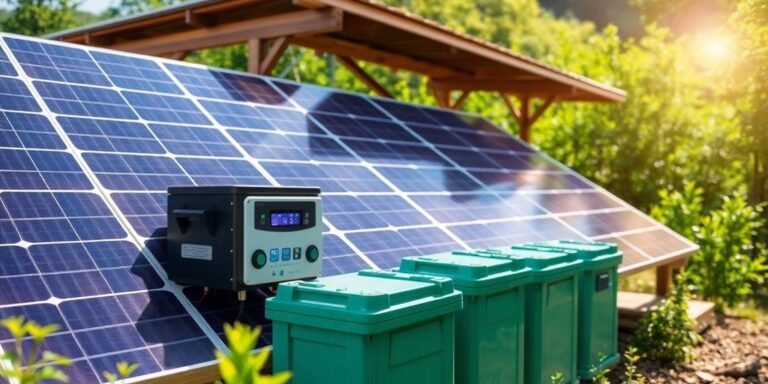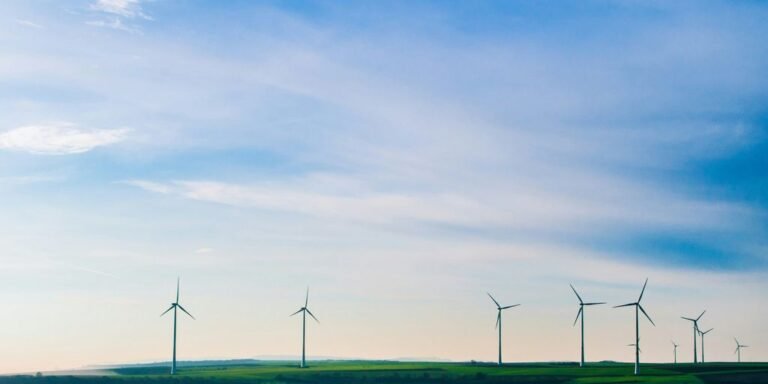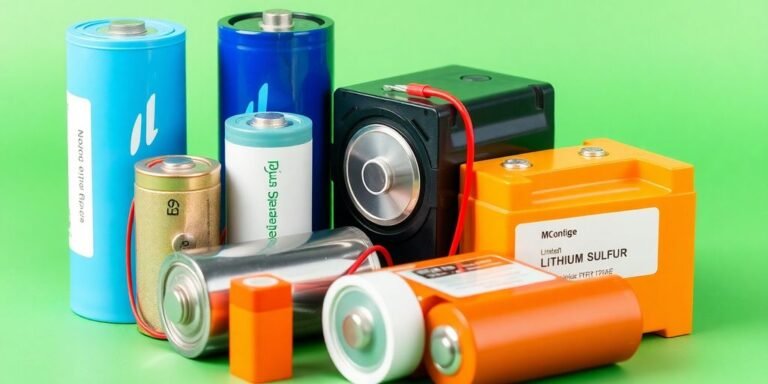Top Benefits of Using a Gas Turbine Generator for Industrial Power
In today’s industrial world, finding the right way to power operations is a big deal. Businesses need energy that’s not just there, but also works well and doesn’t break the bank. That’s where the gas turbine generator really shines. These machines have become a go-to for many companies because they offer a solid mix of benefits that are hard to beat. Let’s take a look at why a gas turbine generator is such a smart choice for industrial power needs.
Key Takeaways
- A gas turbine generator is a top choice for industrial power because it’s highly efficient, meaning it gets a lot of energy out of the fuel it uses.
- These generators are known for being reliable, able to run for long stretches without issues, which is super important for keeping operations smooth.
- They offer great flexibility, able to adapt to different energy demands and even use various types of fuel.
- When it comes to environmental impact, a gas turbine generator is a good option, producing fewer emissions compared to older types of power generation.
- While the upfront cost might seem high, the long-term benefits like lower running costs and durability make the gas turbine generator a cost-effective solution for businesses.
1. High Efficiency
When you’re looking at power generation for a factory, efficiency is a big deal. It basically means how much useful energy you get out of the fuel you put in. Gas turbines have gotten really good at this over the years. They can convert a large percentage of the fuel’s energy directly into electricity, which is pretty impressive.
Think about it like this: the more efficient your power source, the less fuel you burn for the same amount of electricity. This directly translates to lower operating costs and a smaller environmental footprint. It’s one of the main benefits of turbine power for industrial settings.
Here’s a quick look at why they’re so good:
- Advanced Design: Modern gas turbines use sophisticated engineering, like special coatings and better airflow management, to squeeze more power out of every bit of fuel.
- Combined Cycles: Often, gas turbines are paired with steam turbines. The hot exhaust from the gas turbine is used to create steam, which then powers the steam turbine. This ‘combined cycle’ approach significantly boosts overall efficiency.
- Lower Fuel Consumption: Because they’re so efficient, gas turbines use less fuel compared to older technologies to produce the same amount of power.
The drive for higher efficiency in gas turbines isn’t just about saving money; it’s also about making power generation more sustainable. By getting more electricity from less fuel, we reduce waste and lower greenhouse gas emissions. This makes them a smart choice for factories aiming for both economic and environmental goals.
This focus on efficiency means you get more bang for your buck, making them a top choice for efficient energy for factories. Companies like Siemens Energy have been at the forefront of developing these high-performance machines, with many units already installed and proving their worth Siemens Energy offers gas turbines.
While simple cycle efficiencies are already quite good, reaching around 40%, the real magic happens in combined cycle configurations. These setups can push efficiencies even higher, sometimes exceeding 60%.
2. Reliability

When you’re running an industrial operation, downtime isn’t just an inconvenience; it can be a real money-loser. That’s where gas turbine generators really shine. They are built for continuous operation and designed to keep going for extended periods without needing a break. Think of them as the marathon runners of the power generation world. Their simpler design, with fewer moving parts compared to some other engine types, means there’s less that can go wrong. This inherent robustness translates directly into fewer unexpected shutdowns and a more stable power supply for your facility.
This reliability is super important for industries where a consistent power flow is non-negotiable. We’re talking about places like data centers, hospitals, or manufacturing plants that can’t afford even a momentary power interruption. The ability of these turbines to maintain consistent performance, even under demanding conditions, is a major reason why they’re chosen for critical applications. Understanding how power plants maintain reliability, even when operating under challenging conditions, can give you a better picture of these systems strategies for ensuring stable performance.
Here’s a quick look at why they’re so dependable:
- Fewer Moving Parts: Less complexity means fewer potential points of failure. It’s just basic engineering, really.
- Robust Design: They’re engineered to handle tough environments and operate for thousands of hours between major services.
- Proven Technology: Gas turbines have been around for a while and have a solid track record in various demanding sectors.
The consistent performance and long operational life of gas turbines mean you can count on them day in and day out. This predictability is a huge advantage for any business looking to minimize operational risks and maintain productivity.
3. Flexibility
Gas turbine generators are pretty adaptable, which is a big deal for power generation. They aren’t just a one-trick pony; they can handle a lot of different situations.
One of the coolest things is their fuel flexibility. These turbines can run on a variety of fuels. We’re talking natural gas, of course, but also things like diesel, propane, and even some renewable fuels like biogas. This means if one fuel source becomes scarce or too expensive, you can often switch to another without a massive overhaul. It’s like having a backup plan built right in.
This adaptability is super important for keeping the lights on, especially when the grid is unpredictable. It means power plants can adjust on the fly to keep supplying electricity.
Beyond just fuel, they’re also flexible in how they operate. They can ramp up or down pretty quickly, which is great for matching electricity supply with demand. This is especially useful when you’re trying to integrate renewable sources like solar and wind, which can be a bit… well, intermittent. Gas turbines can fill in the gaps when the sun isn’t shining or the wind isn’t blowing.
Here’s a quick look at what makes them so adaptable:
- Can use multiple fuel types: Natural gas, diesel, propane, biogas, and more.
- Quick response time: Can adjust power output rapidly to meet changing demand.
- Modular design: Easier to install and configure for different site needs.
- Integration with renewables: Acts as a reliable backup for intermittent energy sources.
4. Low Emissions
When you’re looking at industrial power generation solutions, one big plus for gas turbines is how clean they run compared to older tech. They produce significantly fewer harmful emissions, which is a pretty big deal these days with all the environmental rules and just general awareness. This makes choosing a gas turbine for industry a smart move if you want to keep your carbon footprint down.
Think about it: these machines are designed to burn fuel very completely. This means less of that nasty stuff like nitrogen oxides (NOx) and sulfur dioxide (SO2) gets pumped into the air. Plus, with modern designs, they’re getting even better. We’re talking about advanced combustion systems that really nail the burn, keeping emissions low without sacrificing power. It’s a win-win for your operations and the planet.
Here’s a quick look at why their emissions profile is so good:
- Reduced NOx: Modern gas turbines use lean-burn technology and other tricks to keep NOx levels way down.
- Minimal SO2: Since they primarily run on natural gas, which has very little sulfur, SO2 emissions are practically non-existent.
- Lower CO2 per unit of energy: While they do produce CO2, they generate less CO2 for every kilowatt-hour produced compared to many other fossil fuel options.
The focus on cleaner combustion isn’t just about meeting regulations; it’s about building more sustainable, responsible industrial power. This is a key factor when considering advantages of on-site power plants.
This focus on low emissions is a major reason why gas turbines are a top choice for businesses aiming for greener operations.
5. Cost-Effective
When you’re looking at powering a business, the price tag is always a big deal, right? Gas turbines might seem like a hefty investment upfront, but honestly, they really pay off over time. Think of it like buying a really good tool – it costs more initially, but it lasts way longer and works better, saving you money down the road.
One of the main reasons they’re so cost-effective is their longevity. These things are built tough and can keep running for years with just regular check-ups. This means you’re not constantly shelling out cash for repairs or, worse, a whole new unit. Plus, their fuel efficiency means you’re burning less fuel to get the power you need, which adds up to significant savings on your energy bills. It’s a smart move for your budget.
The long-term financial benefits of gas turbines often outweigh the initial purchase price. Their durability, low maintenance needs, and efficient fuel consumption contribute to a lower total cost of ownership compared to many other power generation options.
Here’s a quick look at why they save you money:
- Reduced Maintenance: Fewer moving parts mean less can go wrong, and scheduled maintenance is often less intensive than with other engine types. This means less downtime and lower labor costs.
- Fuel Savings: Their high efficiency means you get more power from every unit of fuel, directly cutting your operating expenses.
- Extended Lifespan: Gas turbines are designed for durability, providing reliable power for many years, delaying the need for costly replacements.
While comparing initial costs, it’s important to look at the whole picture. For instance, diesel generators might have a lower entry price, but the ongoing fuel and maintenance expenses can add up. Gas turbines, on the other hand, offer a more predictable and often lower operational cost over their lifespan.
6. Fast Start-Up
When you need power, you need it now. That’s where gas turbine generators really shine. Unlike some other power generation methods that can take a while to get going, these units can spin up to full speed and start producing electricity in a matter of minutes. This rapid response capability is a huge deal for industries where even a short power interruption can cause major problems or significant financial losses.
Think about it: if your plant suddenly needs a big surge of power, or if the grid goes down unexpectedly, you can’t afford to wait around. Gas turbines are built for this kind of quick action. They’re often used in what are called ‘peaking power plants’ because they can be fired up quickly to meet sudden spikes in demand. This makes them super useful for keeping operations running smoothly without interruption.
The ability to start up quickly means you’re not caught off guard by sudden changes in power needs or grid instability. It’s about having control and ensuring your operations continue without a hitch.
This fast start-up feature is particularly important for certain sectors:
- Healthcare facilities: Where consistent power is critical for life support systems.
- Data centers: To prevent data loss or corruption during outages.
- Manufacturing plants: To avoid halting production lines and damaging sensitive equipment.
- Emergency services: Ensuring backup power is available immediately when needed.
This responsiveness is a key reason why many businesses choose gas turbines for their power needs, especially when paired with the reliability of aeroderivative gas turbines. It’s not just about having power; it’s about having it precisely when you need it.
7. Durability
When you’re looking at industrial power solutions, you want something that’s going to stick around and keep working, right? That’s where gas turbine generators really shine. They’re built tough, designed to handle some serious work over a long time. Think of them as the marathon runners of the power generation world.
These machines are engineered to operate in pretty demanding conditions. We’re talking about high temperatures and significant stress, but they’re made with materials and designs that can take it. This means less worry about breakdowns and more consistent power for your operations. It’s not just about surviving harsh environments; it’s about thriving in them.
Several factors contribute to this ruggedness:
- Advanced Materials: Modern turbines use special alloys and coatings that resist wear and tear, even at extreme temperatures. These materials are key to preventing issues like creep, which is a slow deformation under heat and stress.
- Robust Design: The internal workings, while complex, are built for endurance. Fewer moving parts compared to some other engine types can mean less to go wrong over time.
- Environmental Resistance: They’re designed to handle various atmospheric conditions, from dust to humidity, with appropriate filtration and protection systems.
The use of advanced coatings is a big deal for keeping turbines running longer. These protective layers act like a shield, guarding against heat and corrosion, which are major enemies of machinery. It’s a bit like giving your engine a suit of armor that also helps it run cooler and more efficiently. This focus on material science and protective treatments is a big reason why these generators have such a long service life. You can find more about these advancements in turbine durability.
So, if you need a power source that you can count on day in and day out, year after year, without constant fuss, a gas turbine’s durability is a major selling point. It translates directly into less downtime and a more stable bottom line for your business.
8. Scalability
One of the really neat things about gas turbine generators is how adaptable they are. You can essentially tailor the power output to exactly what you need, whether that’s a little bit or a whole lot. This means they’re a great fit for businesses that don’t have a constant energy demand. Think about seasonal businesses, for example, or places that experience big swings in power usage throughout the day.
Need more power? No problem. You can add more turbine units to increase the overall capacity. On the flip side, if your needs decrease, you can scale back without having a massive, underutilized piece of equipment sitting around. This flexibility in sizing the power generation system is a big deal for keeping costs in check and making sure you’re not wasting energy or money.
It’s not just about adding whole new units either. Many systems are designed to be modular, allowing for easier expansion or contraction of capacity. This makes them a smart choice for growing companies or those anticipating changes in their operational demands.
The ability to adjust power output up or down makes gas turbines a practical choice for a wide range of industrial applications, from small operations to large facilities with fluctuating energy requirements.
9. Low Water Usage
When you’re looking at power generation options, water usage can be a pretty big deal, especially if you’re in a region that doesn’t have a lot of it to spare. That’s where gas turbines really shine. Unlike many other power generation methods that guzzle water for cooling, gas turbines need very little, and sometimes none at all. This makes them a fantastic choice for businesses in arid areas or places where water conservation is a major concern. You don’t have to worry as much about the environmental impact or the operational costs associated with water supply and treatment. Plus, they produce significantly less wastewater compared to older technologies, which is another win for the environment. It’s a simple but important benefit that can make a big difference in operational planning and sustainability efforts for any industrial setup. This focus on water conservation is becoming increasingly important for industries worldwide, and gas turbines fit right into that picture. For more on how these turbines work, you can check out industrial gas turbines.
10. Low Noise Levels

When you’re running a business, especially one that’s near residential areas or sensitive facilities like hospitals, noise can be a real headache. Gas turbine generators are surprisingly quiet compared to many other types of power generation equipment. While they do produce some sound, it’s often a more consistent, less jarring hum rather than the clatter and bang you might get from older engine types. This makes them a much more neighbor-friendly option.
It’s not just about being polite, either. Excessive noise can lead to worker fatigue and even health issues over time. The smoother operation of a gas turbine means less vibration and a more stable acoustic environment. This is a big plus for maintaining a productive workplace.
The characteristic whine of a turbine can be managed with proper acoustic enclosures and exhaust silencers, making them suitable for even the most noise-sensitive locations.
Think about it: you need reliable power, but you don’t want your facility to be the loudest thing on the block. Gas turbines strike a good balance here. They offer the power you need without the overwhelming noise pollution that can come with other solutions. This is especially important as industries continue to integrate more advanced technologies, like those found in modern power generation.
Here’s a quick rundown of why their noise profile is a benefit:
- Smoother Operation: Less vibration means less noise transmission.
- Manageable Sound: The sound produced is often easier to dampen than the sharp noises from other engines.
- Worker Comfort: A quieter environment is better for everyone working on-site.
- Community Relations: Being a good neighbor is important, and lower noise helps with that.
Wrapping It Up
So, when you look at everything gas turbine generators bring to the table, it’s pretty clear why so many industries are choosing them. They’re not just about making power; they’re about making it reliably, efficiently, and often with a lighter touch on the environment. From their quick start-up times that keep things running smoothly even when demand spikes, to their ability to keep going for ages with less fuss, these machines are a solid bet for businesses that need dependable energy. Plus, with ongoing tech improvements, they’re only getting better. If your operation needs power you can count on, a gas turbine generator is definitely worth a serious look.
Frequently Asked Questions
What exactly is a gas turbine generator and how does it make power?
A gas turbine generator is like a powerful engine. It burns fuel, like natural gas, to create hot, high-pressure gas. This gas spins a turbine, which is connected to a generator that makes electricity. Think of it like a super-fast pinwheel powered by fire!
Why are gas turbines considered really good for the environment?
Gas turbines are cleaner than many older ways of making power. When they burn fuel, they release fewer harmful gases into the air, like carbon dioxide. Plus, they can even run on cleaner fuels like hydrogen, which is even better for the planet.
Can a gas turbine generator be turned on and off quickly when needed?
Yes, they can! Gas turbines are super speedy. They can start up in just a few minutes, which is great for when you need power right away, like during a sudden demand or if the main power goes out.
Are gas turbines good for businesses that have changing power needs?
Absolutely. Gas turbines are very flexible. You can get them in different sizes, and you can even add more units if your business needs more power. This means they can grow with your company or handle busy and slow periods.
Do gas turbines need a lot of water to work?
Not really. One of the cool things about gas turbines is that they don’t need much water, or sometimes any water at all, to operate. This is a big plus for businesses in dry places where water is hard to find.
Are gas turbines a good long-term investment for a business?
Yes, they can be. Although they might cost a bit more at first, gas turbines are built to last a long time and don’t need constant repairs. They are also very efficient with fuel, which saves money on energy bills over the years.








